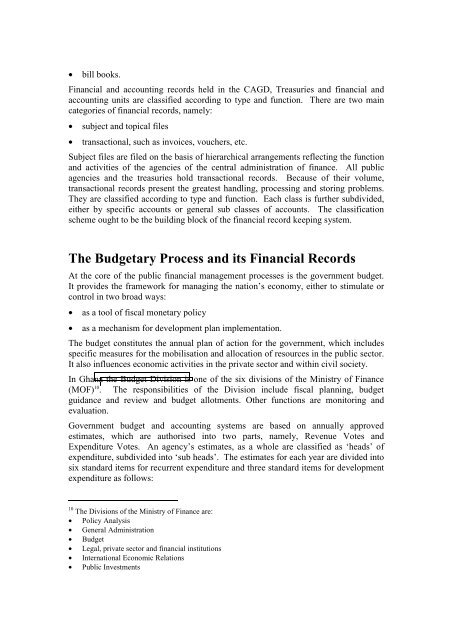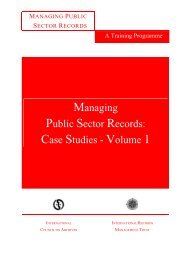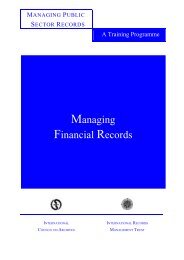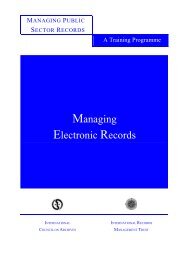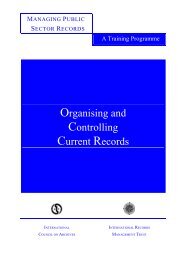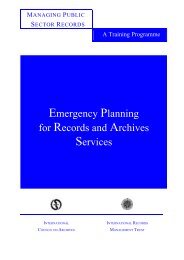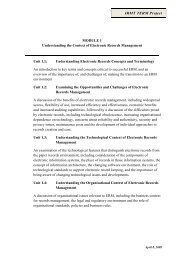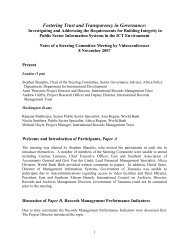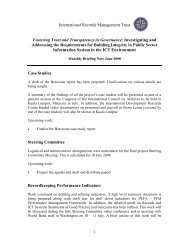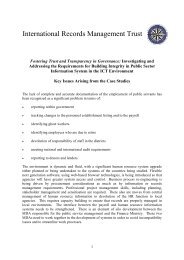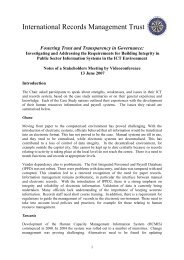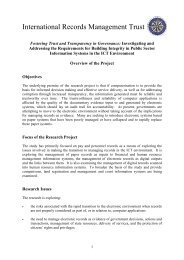managing public sector records: a study programme - International ...
managing public sector records: a study programme - International ...
managing public sector records: a study programme - International ...
You also want an ePaper? Increase the reach of your titles
YUMPU automatically turns print PDFs into web optimized ePapers that Google loves.
• bill books.<br />
Financial and accounting <strong>records</strong> held in the CAGD, Treasuries and financial and<br />
accounting units are classified according to type and function. There are two main<br />
categories of financial <strong>records</strong>, namely:<br />
• subject and topical files<br />
• transactional, such as invoices, vouchers, etc.<br />
Subject files are filed on the basis of hierarchical arrangements reflecting the function<br />
and activities of the agencies of the central administration of finance. All <strong>public</strong><br />
agencies and the treasuries hold transactional <strong>records</strong>. Because of their volume,<br />
transactional <strong>records</strong> present the greatest handling, processing and storing problems.<br />
They are classified according to type and function. Each class is further subdivided,<br />
either by specific accounts or general sub classes of accounts. The classification<br />
scheme ought to be the building block of the financial record keeping system.<br />
The Budgetary Process and its Financial Records<br />
At the core of the <strong>public</strong> financial management processes is the government budget.<br />
It provides the framework for <strong>managing</strong> the nation’s economy, either to stimulate or<br />
control in two broad ways:<br />
• as a tool of fiscal monetary policy<br />
• as a mechanism for development plan implementation.<br />
The budget constitutes the annual plan of action for the government, which includes<br />
specific measures for the mobilisation and allocation of resources in the <strong>public</strong> <strong>sector</strong>.<br />
It also influences economic activities in the private <strong>sector</strong> and within civil society.<br />
In Ghana the Budget Division is one of the six divisions of the Ministry of Finance<br />
(MOF) 10 . The responsibilities of the Division include fiscal planning, budget<br />
guidance and review and budget allotments. Other functions are monitoring and<br />
evaluation.<br />
Government budget and accounting systems are based on annually approved<br />
estimates, which are authorised into two parts, namely, Revenue Votes and<br />
Expenditure Votes. An agency’s estimates, as a whole are classified as ‘heads’ of<br />
expenditure, subdivided into ‘sub heads’. The estimates for each year are divided into<br />
six standard items for recurrent expenditure and three standard items for development<br />
expenditure as follows:<br />
10<br />
The Divisions of the Ministry of Finance are:<br />
• Policy Analysis<br />
• General Administration<br />
• Budget<br />
• Legal, private <strong>sector</strong> and financial institutions<br />
• <strong>International</strong> Economic Relations<br />
• Public Investments


